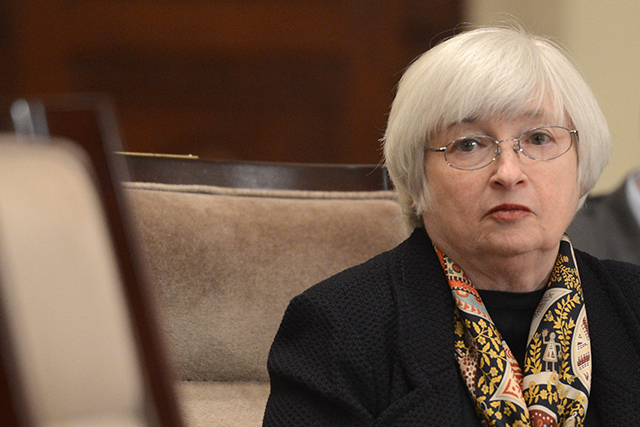9 Things Janet Yellen Tried to Say Carefully as the Dow Plunged
Ken McIntyre /
Janet Yellen appeared to emerge with her confidence intact this afternoon after her first press conference as chairman of the Federal Reserve. However, stock markets dropped sharply when, as head of the nation’s central bank, she said the Fed may begin to raise interest rates “six months” after the final tapering off of a bond-buying program.
The Dow Jones Industrial Average regained much of the lost ground but “seemed surprised at Yellen’s specificity,” as veteran Fox Business reporter Rich Edson wrote.
Yellen made a 15-minute statement she characterized as a continuation of Fed policy under predecessor Ben Bernanke, then comfortably fielded questions from 15 reporters for another 45 minutes.
About halfway through her session with reporters, Yellen was asked by Ann Saphir of Reuters to define a “considerable” period after completing asset purchases before the Fed raises rates. She replied it “probably means six months or something like that.” The markets reacted.
To a layman, Yellen appeared to say only a few other remarkable things in response to queries:
“The head winds from the [economic] crisis have taken a very long time to dissipate,” she told CNBC’s Steve Liesman.
“We have had a disappointing recovery,” she conceded to Wyatt Andrews of CBS.
“There are a lot of kids who are shacking up with their families,” she said to ABC’s Rebecca Jarvis.
When Yellen sat down at 2:30 p.m. in front of the roomful of reporters, as it turned out, a Heritage Foundation event assessing the first 100 years of the Federal Reserve was wrapping up following presentations by three economists—Lawrence H. White (George Mason University), George Selgin (University of Georgia), and Jerry Dwyer (Clemson University).
White said “the volatility of the economy” now resembles the pre-Fed period, adding that the Fed “has contributed moral hazards” and “raised inflation without giving us better business cycles.”
Selgin said despite a “mythology” created by pro-Fed propaganda, “there has never been a recovery worse than this [and] there is no reason to think doing nothing would have turned out worse.”
Dwyer said current Fed policy “can’t accomplish the goal of lowering the unemployment rate substantially.”
It’s doubtful the trio’s detailed critiques would have rattled the silver-haired Yellen, judging by her smooth, self-controlled debut under the scrutiny of reporters from leading newspapers, wire services, and networks. She spoke about the nuances of monetary policy, inflation, and long-term unemployment with an even tone and a colorful scarf around her neck. She gestured measuredly, one arm at a time, with open hand, closed fist, or pinched thumb and forefinger.
Here are nine things she said more carefully in reply to reporters’ questions:
1. “I’d simply warn you that these dots are going to move up and down over time, a little bit this way and that. … I really don’t think it’s appropriate to read that much into it.”
2. “We want the policy we put in place to be appropriate for the economic conditions that will prevail.”
3. “We probably overdid the optimism in January… But from December to March, the committee’s views are largely unchanged.”
4. “In many ways, I feel the buck stops with me … I don’t envision nor do I anticipate any radical change.”
5. “[Many indicators] are moving in the direction of improvement.”
6. “I do expect housing activity to begin to expand more rapidly later on.”
7. “We want to be extremely cognizant of emerging threats to the financial system.”
8. “I try to stay in touch with what’s happening with real people in the economy.”
9. “We will try to continue to try to communicate as clearly as we possibly can about how we would conduct monetary policy [and] not to be a source of instability here.”
Heritage Foundation President Jim DeMint, in introducing the think tank’s panel of experts on the Fed, said the lack of knowledge in Congress about the Fed and the nation’s monetary system should give every American pause.
Heritage encourages an open debate on the subject, DeMint said before turning over the program to moderator Norbert Michel, research fellow in financial regulations. A video of the entire Heritage event will be posted here.
This story was produced by The Foundry’s news team. Nothing here should be construed as necessarily reflecting the views of The Heritage Foundation.

